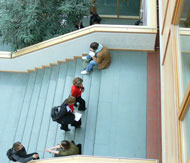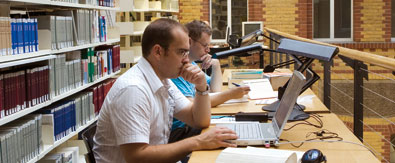Short film projects
The Center for Intercultural Learning regularly organizes project seminars in which intercultural topics are turned into a film. These film clips are presented on this page.
They are produced in different languages, some of them are in English, others in German or French.
The Projects:
"Creating short films from Critical Incidents" - Short Film project during summer term 2017
This seminar, lectured by Erik Malchow and Ulrike Zillmer, was directly related to the brochure "A Matter of Perspective - Critical incidents from Studentenwerke and Higher Education institutions" by Deutsches Studentenwerk. The participants worked on six Critical Incidents from the brochure and created the following four short films out of it:
- "Emphatic nodding" / "The counter" (3:22) by Janet Caman, Benjamin Kämpfer, Preeyawan Maneerat, Magdalena Tsaneva
- "The group appointment" / "No reply" (3:19) by Julia Vogler, Sergio Herna´n Salas, Natalia Tchamiashvili
- "The silent wife" (3:00) by Olga Dub, Marcelo Gutierrez, Guilherme Emrich, Luis Teran
- "Room assignment" (2:30) by Rosa Isela Gonzáles Mandragón, Leticia Quintana Arellano
Instructions on how to work with those incidents in a training setting and different perspectives on the incidents from several cultural experts can be both found in the brochure.
Short film project as part of/ in the context of the Quality Initiative Intercultural Competence at the DFH 2014
The seminar was dedicated to the research field German-French university context, examined various intercultural research approaches and scrutinized didactic implications of such research. Students were asked to reflect on their own experiences as well as to explore intercultural challenges for German-French study programs. Subsequently they considered alternatives as to how the results might be workable for all involved (students, teachers). From this emerged a series of Critical Incidents (= critical interaction situations from an intercultural point of view), which were then further developed into didactic materials by using applied research methods.
- bref. en Allemagne (2:32) (worksheet) In the film "bref. en Allemagne" the French student Stéphanie describes her first day as an Erasmus student in Frankfurt (Oder), using wit and humor to portray (stereo-)typical contact situations between German and French students as well as everyday life at a German University.
- Gardinenpredigt (5:22) (worksheet) German students criticize their lecturer openly in a lecture, which culminates in a debate with a colleague. Learning and teaching habits in Germany and France are contrasted here.
- DFH News (11:11) (worksheet) The "DFH-News" look at the case of the French elite student Camille Martin, who feels forced to drop out of college due to major differences between the German and French university systems. An expert interview analyses the different tuitional structures and formal differences in composing seminar papers.
„Critical incidents Students – Staff“ - Short Film Project in the context of Peernet 2012
The seminar „ Medium Film in intercultural training“ during the summer term 2012, a follow-up project in the framework of the Peernet Program, produced another five short films.There was only a minor difference in the approach compared to 2009 as the target group of the planned films were employees and staff at universities whereas the previous project had focused on the intercultural education of students.
- Tandem gesucht (9:17) by Bianca Baumann, Theresa Brüheim, Isabel Härdtle and Katharina Puche (worksheet): The short film “Tandem gesucht” is about the German Student Martin (Peter Britz) who is looking for an Italian tandem partner. The film draws attention to intercultural aspects such as proximity, collectivism and tolerance for ambiguity in a figurative and humorous way.
- Besprechung mit einem Finnen (8:18) by Sara Bonin, Justine Schega and Lauri Turpeinen (worksheet): In the film “Besprechung mit einem Finnen” students examine differences in communication between Germans and Finns. The film shows a German university employee close to despair when one of her questions to the Finnish student is answered only sparsely. But also the Finnish student feels misunderstood, which becomes clear in the subsequent videoconference with his Finnish friend.
- Dreifach International (8:03) by Georg Göschl, Simeone Jacob and Helena Wöhl Coelho (worksheet follows): “Dreifach international” depicts the personal backgrounds of three students in the trinational masters program Media, Communication, Culture (MCC) Georg Göschl (Österreich), Simeone Jacob (Bulgarien) and Helena Wöhl Coelho (Brasilien) and explains strategies of dealing with intercultural misunderstandings. All three students illustrate their different experiences with bureaucratic and cultural idiosyncracies by way of example.
- Kulturell sensibel (worksheet follows) The film documentation of staff interviews “Kulturell sensibel” shows how staff deals with international students and what strategies they have developed to counsel/advise them competently. Employees at the International Students Office of the European University Viadrina describe worst- and best-case scenarios they have experienced with international students and offer the viewer a wide range of possible situations as well as useful advice in dealing with international students. The students Tina Schmitt and Charlotte Stromberg conducted the interviews. (worksheet)
- Ein Raum für Naim by Baptiste Courcier, Moundim Lambach, Thomas Scirpo and Alexandre Sejourne (worksheet follows): Four French students describe in an exaggerated and sometimes comical manner the problems foreign students might encounter when looking for an apartment in a foreign city in a foreign country, thus providing a glimpse into the perspective of an Erasmus student.
Short Film Project in the context of Peernet 2009
The practice seminar in the summer term 2009 gave students an opportunity to reflect on Critical Incidents (critical intercultural interaction situations) and put them on film /turn them into films. During the seminar the necessary theoretical principles were acquired and four critical incidents chosen for cinematic implementation. Filming took place in small international groups with the seminar facilitator (Erik Malchow) taking charge of the camera work. The following films (in English language) were produced and can be used for teaching purposes in intercultural trainings. Didactic ideas for the Critical Incidents films have been included.
- Nice to greet you.(7:25) by Vera Nikonorova and Alexander Steinhart (worksheet)
- Where are you from? (7:17) by Alina Apostu, Andrea Herda Muñoz and Petya Borisova (worksheet)
- Culture for Dinner (9:32) by Leman Sahinci and Ahmet Sirma (worksheet)
- Love Story (9:31) by Irena Shopova, Burak Asan and Harun Reşit Han (worksheet)



